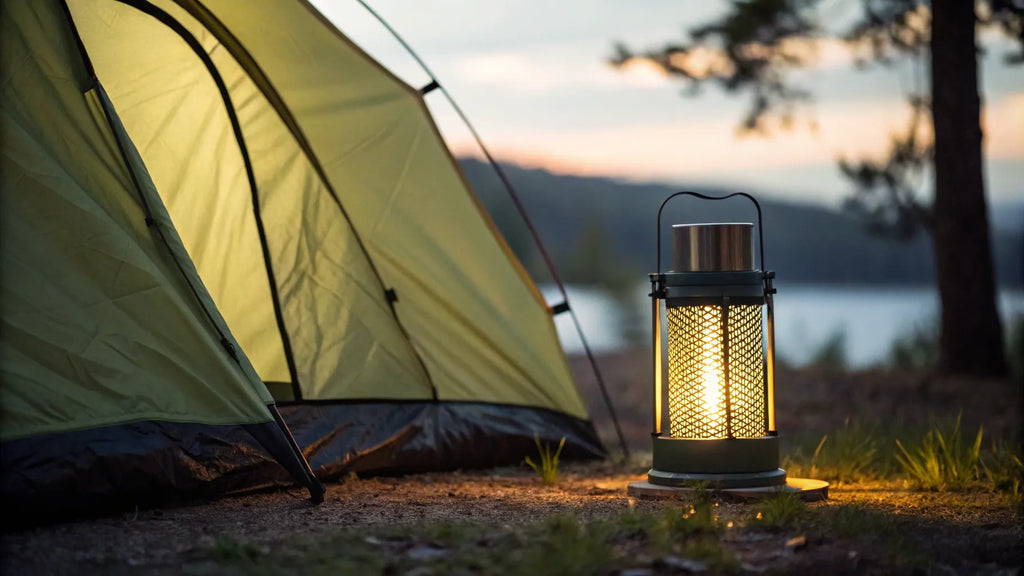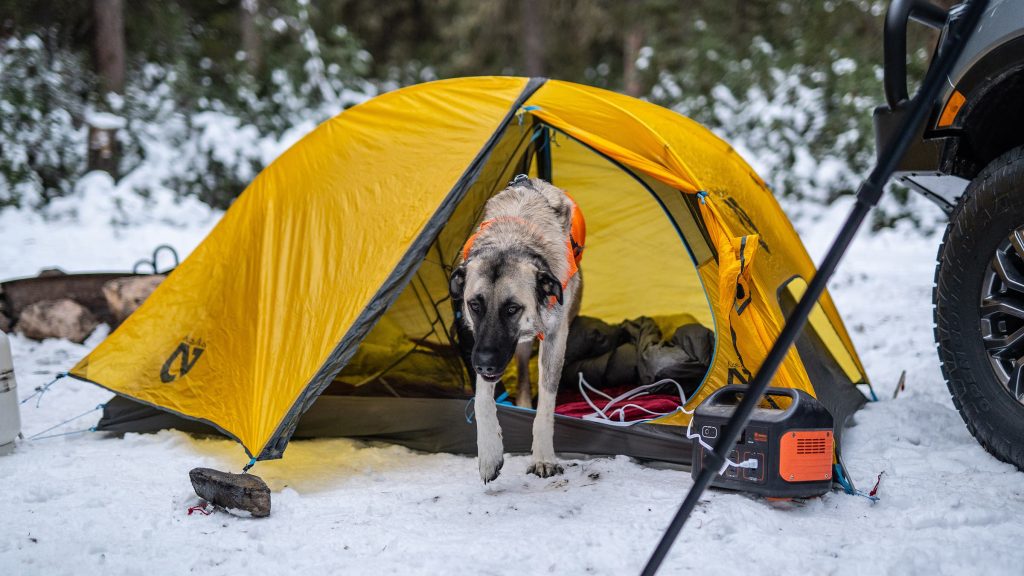Are you wondering if you can safely put a heater in your camping tent to stay warm on chilly nights? It’s a question many campers ask when the temperature drops, especially if you want to enjoy the outdoors without shivering.
But before you grab any heater and head out, there are important things you need to know. This guide will help you understand the safest options, what to avoid, and how to keep your tent cozy without risking your safety.
Keep reading—you don’t want to miss these crucial tips that could make or break your camping experience.
Tent Heating Basics
Camping in cold weather needs warmth inside your tent. A heater can make your stay comfortable and safe.
It is important to know the right types of heaters and how they work before using one in your tent.
Types Of Tent Heaters
There are different heaters for tents. Each type works in its own way and has safety rules.
- Propane Heaters:Use gas to produce heat. They warm up fast but need good air flow.
- Electric Heaters:Plug into power sources. They are safe and clean but need electricity.
- Battery-Heated Pads:Small and portable. They keep you warm but only heat a small area.
- Wood-Burning Stoves:Use small fires inside a stove. They give strong heat but need careful setup.
How Tent Heaters Work
Tent heaters work by changing fuel or electricity into heat. This heat warms the air inside the tent.
Most heaters blow warm air or radiate heat. Proper ventilation is needed to keep air safe and fresh.
- Propane heaters burn gas and release heat and carbon dioxide.
- Electric heaters convert electricity to heat with wires or coils.
- Battery pads use electric current to heat the surface you touch.
- Wood stoves burn wood inside a metal box, sending heat out through the stove walls.
Safety Precautions
Using a heater inside a camping tent can keep you warm. It is important to follow safety rules. These rules protect you and others.
Heaters can cause problems like fires and bad air. Knowing these dangers helps you stay safe.
Ventilation Importance
Good airflow in a tent stops harmful gases from building up. Always keep a vent or window open.
Without fresh air, carbon monoxide and other gases can cause sickness or death. Ventilation keeps air fresh and safe.
Fire Hazards
Heaters can start fires if placed wrong or left unattended. Use heaters made for tents only.
Keep heaters away from flammable items like sleeping bags and walls. Always turn off heaters before sleeping.
- Place heater on a stable, flat surface
- Do not use heaters near fabric or paper
- Check heater for damage before use
- Have a fire extinguisher nearby
Carbon Monoxide Risks
Carbon monoxide is a colorless, odorless gas. It can build up quickly inside a tent with a heater.
Breathing carbon monoxide can cause headaches, dizziness, or death. Always use a carbon monoxide detector.
- Never use fuel-burning heaters without ventilation
- Do not sleep near a running heater
- Turn off heaters before sleeping
- Use battery-powered carbon monoxide alarms
Best Heater Options
Camping in cold weather can be tough without heat. A heater can make your tent warm and cozy.
Choosing the right heater depends on safety, fuel, and how much heat you need.
Portable Electric Heaters
Portable electric heaters are easy to use with a power source. They do not produce fumes or smoke.
These heaters are quiet and safe but need electricity from a battery or generator.
- Use only with reliable power supply
- Keep away from water inside the tent
- Choose models with automatic shut-off
Propane Heaters
Propane heaters work well for camping without electricity. They produce good heat quickly.
They need proper ventilation to avoid carbon monoxide buildup inside the tent.
- Always use in a well-ventilated tent
- Check for leaks before lighting
- Use models with safety shut-off features
Catalytic Heaters
Catalytic heaters burn fuel without a flame. They are safer for indoor use than propane.
These heaters give steady heat and use less oxygen but still need ventilation.
- Use only in tents with airflow
- Do not block air vents
- Fuel options include propane or butane
Wood Stove Alternatives
Small wood stoves offer a traditional heat source for camping. They need a stove pipe for smoke.
Wood stoves require a fireproof floor pad and space around for safety.
- Use dry, seasoned wood only
- Install proper chimney for smoke exit
- Keep flammable materials away

Credit: ourwanders.com
Setup Tips
Using a heater inside your camping tent can keep you warm in cold weather. You must set it up safely to avoid accidents.
Follow these tips to place your heater correctly, secure fuel, and watch the temperature inside your tent.
Proper Heater Placement
Put the heater on a flat, stable surface to stop it from tipping over. Keep it away from tent walls and sleeping bags.
Ensure there is enough space around the heater for air to flow. This helps the heater work well and reduces fire risk.
- Place heater at least 3 feet from tent walls
- Keep it away from flammable materials
- Do not block air vents or openings
- Use a heat-resistant mat if needed
Securing Fuel Sources
Store fuel outside the tent in a safe container. Do not keep gas or propane inside the tent to avoid fumes and fire hazards.
Check fuel connections before lighting the heater. Make sure there are no leaks or damage to hoses and tanks.
- Use only approved fuel containers
- Keep fuel away from heat and sparks
- Inspect fuel lines for cracks or leaks
- Turn off fuel supply when not in use
Monitoring Temperature
Keep an eye on the temperature inside the tent. Avoid overheating to prevent breathing problems and discomfort.
Use a thermometer to check heat levels. Open vents or doors if the tent feels too hot or stuffy.
- Check temperature regularly
- Keep ventilation open for fresh air
- Turn off heater if air feels stale
- Use a carbon monoxide detector if possible
Emergency Measures
Using a heater inside a camping tent can be risky. It is important to know how to act in emergencies.
Being prepared helps keep you safe if something goes wrong with your heater.
Detecting Carbon Monoxide
Carbon monoxide is a dangerous gas made by heaters. It has no smell or color.
Watch for signs like headache, dizziness, or feeling very tired. These can mean carbon monoxide is present.
- Install a carbon monoxide detector in your tent
- Ventilate your tent to allow fresh air
- Leave the tent immediately if you feel sick
First Aid For Burns
If you get burned by the heater, cool the burn with clean water for 10 minutes.
Do not use ice or creams. Cover the burn with a clean cloth and seek medical help if needed.
- Cool burn with water immediately
- Cover with a clean, dry cloth
- Do not break blisters
- Get medical help for large or serious burns
Fire Extinguisher Use
Keep a fire extinguisher near your tent when using a heater. Know how to use it safely.
To use, pull the pin, aim at the fire base, squeeze the handle, and sweep side to side.
- Pull the safety pin
- Aim nozzle at fire base
- Squeeze the handle to spray
- Sweep nozzle side to side
- Call for help if fire grows

Credit: www.battlbox.com
Alternative Warming Methods
Using a heater inside a camping tent can be risky and unsafe. There are safer ways to stay warm while camping. These methods help keep your body heat inside the tent.
Try using insulated gear, thermal blankets, or hot water bottles. These options reduce the chance of fire or carbon monoxide poisoning.
Insulated Sleeping Gear
Insulated sleeping bags and pads keep heat close to your body. They block cold air from coming in.
Look for sleeping gear rated for cold temperatures. The insulation traps warmth and helps you sleep better.
- Use a sleeping bag with good insulation
- Place an insulated sleeping pad under you
- Wear warm clothes inside your sleeping bag
Thermal Blankets
Thermal blankets reflect your body heat back to you. They are thin, lightweight, and easy to carry.
Wrap yourself in a thermal blanket to keep warm. Use it inside your sleeping bag for extra heat.
- Choose blankets made of mylar or similar material
- Use as a layer over or under your regular blanket
- Keep blankets dry to maintain warmth
Hot Water Bottles
Hot water bottles provide heat for several hours. Fill them with warm water before bedtime.
Place the bottle inside your sleeping bag near your feet or hands. It helps keep your body warm in cold weather.
- Use a sturdy bottle that does not leak
- Wrap the bottle in a cloth to avoid burns
- Refill with hot water if needed during the night

Credit: www.reddit.com
Frequently Asked Questions
Is It Safe To Use A Heater In A Tent?
Using a heater in a tent can be safe with precautions. Opt for heaters designed for indoor or camping use. Ensure proper ventilation to prevent carbon monoxide buildup. Always follow the manufacturer’s safety guidelines. Never leave the heater unattended, and turn it off before sleeping.
What Type Of Heater Is Best For Camping Tents?
Propane heaters are popular for camping tents due to their efficiency. Electric heaters can also be used if you have access to power. Choose heaters with safety features like tip-over protection and automatic shut-off. Always prioritize models specifically designed for indoor or camping environments.
How To Avoid Carbon Monoxide Poisoning In A Tent?
Ensure adequate ventilation when using any fuel-based heater. Keep a window or vent slightly open. Use a carbon monoxide detector inside the tent for added safety. Never use heaters that aren’t designed for indoor use. Regularly check for any leaks or malfunctions in the heater.
Can I Use Electric Heaters Inside A Tent?
Yes, electric heaters can be used in tents if power is available. They are generally safer than gas heaters. Ensure the heater has safety features like tip-over protection. Keep it away from flammable materials. Follow the manufacturer’s instructions for safe use in confined spaces.
Conclusion
Using a heater in your camping tent can make cold nights warmer and more comfortable. Always choose a heater designed for tents and follow safety rules. Never leave the heater on while sleeping or unattended. Good ventilation is key to avoid dangers like carbon monoxide.
Small steps keep your camping safe and cozy. Enjoy your outdoor adventure with warmth and care. Stay safe, stay warm, and have fun camping!

